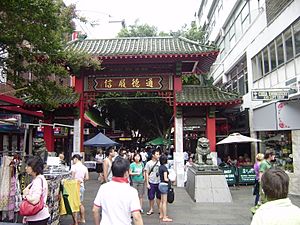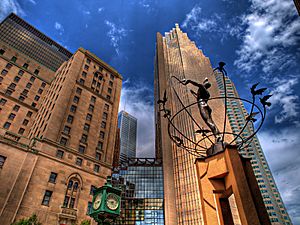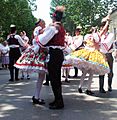Multiculturalism facts for kids
Multiculturalism is a way of describing a society where many different cultures live side-by-side. Imagine a big city where people from all over the world live, work, and share their traditions. That's a multicultural society!
In a multicultural society, there isn't one "official" culture that everyone has to follow. Instead, all cultures are respected and valued equally. This means people can celebrate their own holidays, speak their own languages, and share their unique customs without feeling like they don't belong.
This kind of society often forms when people from many different countries move to one place. For multiculturalism to work well, people need to be tolerant of others and fight against xenophobia, which is a fear or dislike of people from other countries.
What is Multiculturalism?
Multiculturalism is also a way of thinking about how societies should handle cultural and religious differences. It's about making sure everyone feels included and recognized, no matter their background.
Many discussions about multiculturalism focus on whether it's the best way to help people from different backgrounds and immigrants fit into a new country.
Where is Multiculturalism Common?

Since the 1970s, multiculturalism has been an official policy in several Western countries. This happened for different reasons in each country. One big reason is that many large cities in the Western world now have people from many different cultures living in them.
The Canadian government is often seen as a leader in multicultural ideas. This is because Canada has always highlighted how important immigration is to its society. Canada was one of the first countries to make multiculturalism an official national policy in 1971. Australia followed in 1973, and it's still an important policy there today. Many countries in the European Union also quickly adopted similar policies.
However, some countries in Europe, like the Netherlands and Denmark, have recently changed their minds. They have moved away from official multiculturalism. There are also discussions in the United Kingdom about whether multicultural policies are working well.
Some leaders, like former Prime Ministers David Cameron of the UK, John Howard of Australia, and former Chancellor Angela Merkel of Germany, have shared concerns about how well multicultural policies help immigrants integrate into society.
Many countries in Africa, Asia, and the Americas are also very diverse. They are "multicultural" in the sense that many cultures live there. These countries often have policies that are similar to Western multicultural policies. However, their history is different, and sometimes their goal is to build a single national identity, like Malaysia's aim to create a "Malaysian race."
Images for kids
-
People of Indian origin in India Square, Jersey City, New Jersey, US. This area is known as Little Bombay.
-
Teotihuacán in Mexico.
-
An ethno-linguistic map of the Second Polish Republic from 1937, showing different language groups.
-
The Süleymanìye Mosque in Tilburg, built in 2001.
-
The Durga Puja festival celebrated in Kolkata, India.
-
The Jama Masjid, Delhi, one of the largest mosques in India.
-
An Ainu man from around 1930.
-
The Russian Orthodox Cathedral of the Most Holy Trinity in Buenos Aires.
See also
 In Spanish: Multiculturalismo para niños
In Spanish: Multiculturalismo para niños
 | Audre Lorde |
 | John Berry Meachum |
 | Ferdinand Lee Barnett |



















